Detailed Report: Bhutan's Education Policy, Challenges, and Solutions
VerifiedAdded on 2023/06/03
|9
|2215
|134
Report
AI Summary
This report provides an in-depth analysis of the Bhutan education policy, examining its core principles and objectives. It delves into the current education system, highlighting existing problems and challenges, and proposes potential solutions to streamline and improve the overall system. The report discusses the roles of various authoritative bodies involved in regulating and governing the policy, including the Prime Minister's office, the finance ministry, and the Ministry of Education. It also outlines the policy's direct impact on key stakeholders such as students, teachers, parents, and school administration. The report further details specific policies aimed at enhancing learning, providing food security, fostering teacher collaboration, supporting students, establishing professional standards, and improving teacher training and compensation. Finally, it outlines the implementation procedures necessary for effectively realizing the policy's goals, emphasizing the importance of providing resources, addressing student difficulties, analyzing data, and promoting pride in the educational system.
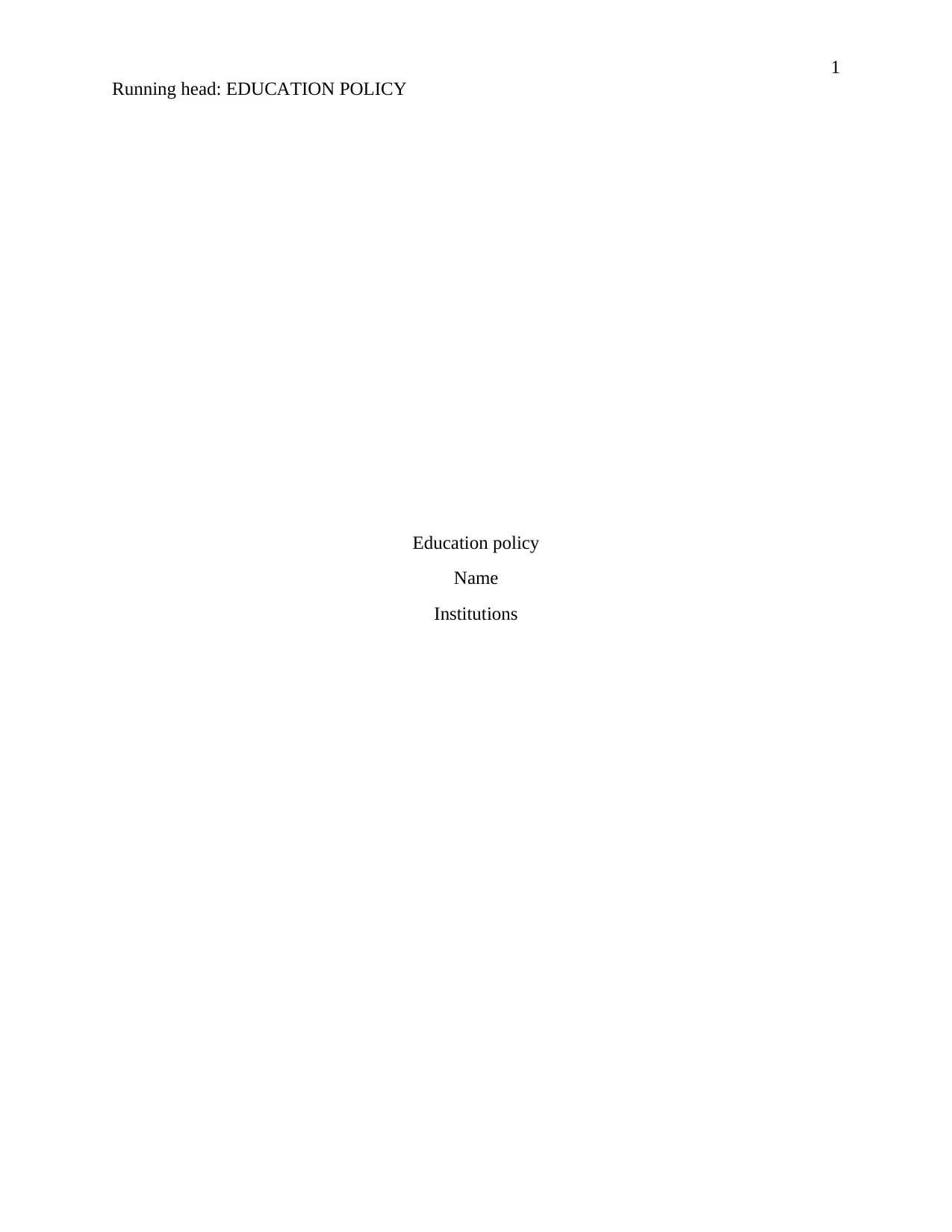
1
Running head: EDUCATION POLICY
Education policy
Name
Institutions
Running head: EDUCATION POLICY
Education policy
Name
Institutions
Paraphrase This Document
Need a fresh take? Get an instant paraphrase of this document with our AI Paraphraser
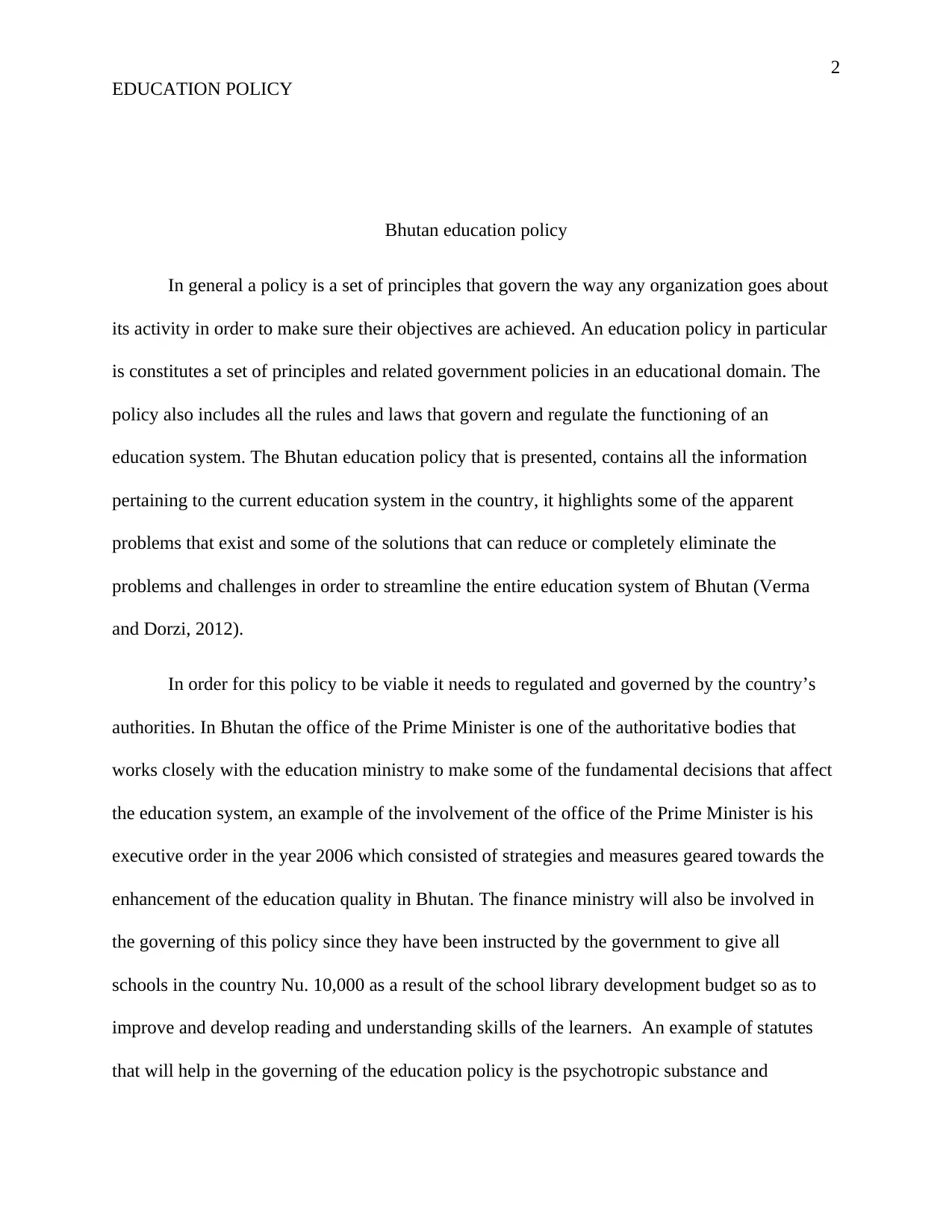
2
EDUCATION POLICY
Bhutan education policy
In general a policy is a set of principles that govern the way any organization goes about
its activity in order to make sure their objectives are achieved. An education policy in particular
is constitutes a set of principles and related government policies in an educational domain. The
policy also includes all the rules and laws that govern and regulate the functioning of an
education system. The Bhutan education policy that is presented, contains all the information
pertaining to the current education system in the country, it highlights some of the apparent
problems that exist and some of the solutions that can reduce or completely eliminate the
problems and challenges in order to streamline the entire education system of Bhutan (Verma
and Dorzi, 2012).
In order for this policy to be viable it needs to regulated and governed by the country’s
authorities. In Bhutan the office of the Prime Minister is one of the authoritative bodies that
works closely with the education ministry to make some of the fundamental decisions that affect
the education system, an example of the involvement of the office of the Prime Minister is his
executive order in the year 2006 which consisted of strategies and measures geared towards the
enhancement of the education quality in Bhutan. The finance ministry will also be involved in
the governing of this policy since they have been instructed by the government to give all
schools in the country Nu. 10,000 as a result of the school library development budget so as to
improve and develop reading and understanding skills of the learners. An example of statutes
that will help in the governing of the education policy is the psychotropic substance and
EDUCATION POLICY
Bhutan education policy
In general a policy is a set of principles that govern the way any organization goes about
its activity in order to make sure their objectives are achieved. An education policy in particular
is constitutes a set of principles and related government policies in an educational domain. The
policy also includes all the rules and laws that govern and regulate the functioning of an
education system. The Bhutan education policy that is presented, contains all the information
pertaining to the current education system in the country, it highlights some of the apparent
problems that exist and some of the solutions that can reduce or completely eliminate the
problems and challenges in order to streamline the entire education system of Bhutan (Verma
and Dorzi, 2012).
In order for this policy to be viable it needs to regulated and governed by the country’s
authorities. In Bhutan the office of the Prime Minister is one of the authoritative bodies that
works closely with the education ministry to make some of the fundamental decisions that affect
the education system, an example of the involvement of the office of the Prime Minister is his
executive order in the year 2006 which consisted of strategies and measures geared towards the
enhancement of the education quality in Bhutan. The finance ministry will also be involved in
the governing of this policy since they have been instructed by the government to give all
schools in the country Nu. 10,000 as a result of the school library development budget so as to
improve and develop reading and understanding skills of the learners. An example of statutes
that will help in the governing of the education policy is the psychotropic substance and
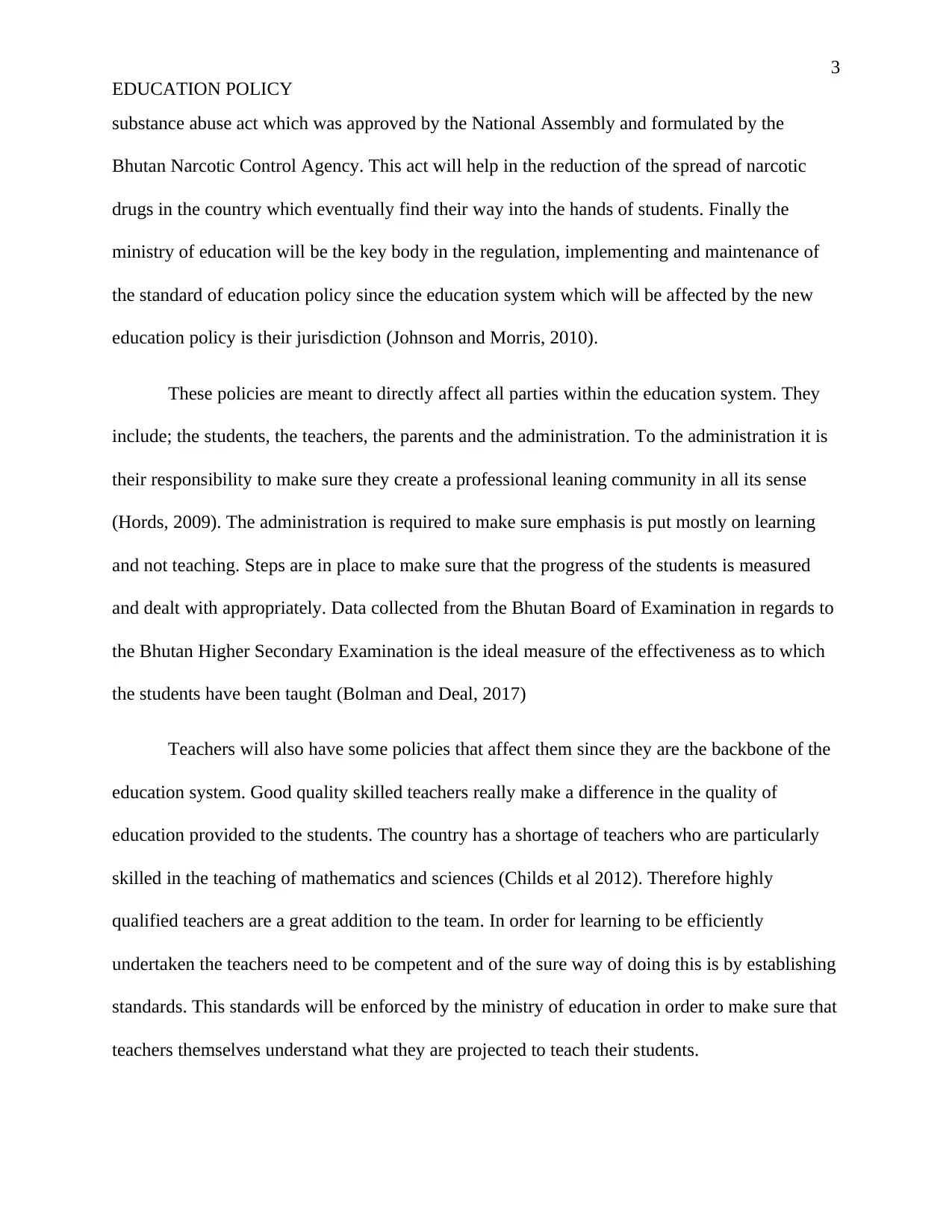
3
EDUCATION POLICY
substance abuse act which was approved by the National Assembly and formulated by the
Bhutan Narcotic Control Agency. This act will help in the reduction of the spread of narcotic
drugs in the country which eventually find their way into the hands of students. Finally the
ministry of education will be the key body in the regulation, implementing and maintenance of
the standard of education policy since the education system which will be affected by the new
education policy is their jurisdiction (Johnson and Morris, 2010).
These policies are meant to directly affect all parties within the education system. They
include; the students, the teachers, the parents and the administration. To the administration it is
their responsibility to make sure they create a professional leaning community in all its sense
(Hords, 2009). The administration is required to make sure emphasis is put mostly on learning
and not teaching. Steps are in place to make sure that the progress of the students is measured
and dealt with appropriately. Data collected from the Bhutan Board of Examination in regards to
the Bhutan Higher Secondary Examination is the ideal measure of the effectiveness as to which
the students have been taught (Bolman and Deal, 2017)
Teachers will also have some policies that affect them since they are the backbone of the
education system. Good quality skilled teachers really make a difference in the quality of
education provided to the students. The country has a shortage of teachers who are particularly
skilled in the teaching of mathematics and sciences (Childs et al 2012). Therefore highly
qualified teachers are a great addition to the team. In order for learning to be efficiently
undertaken the teachers need to be competent and of the sure way of doing this is by establishing
standards. This standards will be enforced by the ministry of education in order to make sure that
teachers themselves understand what they are projected to teach their students.
EDUCATION POLICY
substance abuse act which was approved by the National Assembly and formulated by the
Bhutan Narcotic Control Agency. This act will help in the reduction of the spread of narcotic
drugs in the country which eventually find their way into the hands of students. Finally the
ministry of education will be the key body in the regulation, implementing and maintenance of
the standard of education policy since the education system which will be affected by the new
education policy is their jurisdiction (Johnson and Morris, 2010).
These policies are meant to directly affect all parties within the education system. They
include; the students, the teachers, the parents and the administration. To the administration it is
their responsibility to make sure they create a professional leaning community in all its sense
(Hords, 2009). The administration is required to make sure emphasis is put mostly on learning
and not teaching. Steps are in place to make sure that the progress of the students is measured
and dealt with appropriately. Data collected from the Bhutan Board of Examination in regards to
the Bhutan Higher Secondary Examination is the ideal measure of the effectiveness as to which
the students have been taught (Bolman and Deal, 2017)
Teachers will also have some policies that affect them since they are the backbone of the
education system. Good quality skilled teachers really make a difference in the quality of
education provided to the students. The country has a shortage of teachers who are particularly
skilled in the teaching of mathematics and sciences (Childs et al 2012). Therefore highly
qualified teachers are a great addition to the team. In order for learning to be efficiently
undertaken the teachers need to be competent and of the sure way of doing this is by establishing
standards. This standards will be enforced by the ministry of education in order to make sure that
teachers themselves understand what they are projected to teach their students.
⊘ This is a preview!⊘
Do you want full access?
Subscribe today to unlock all pages.

Trusted by 1+ million students worldwide
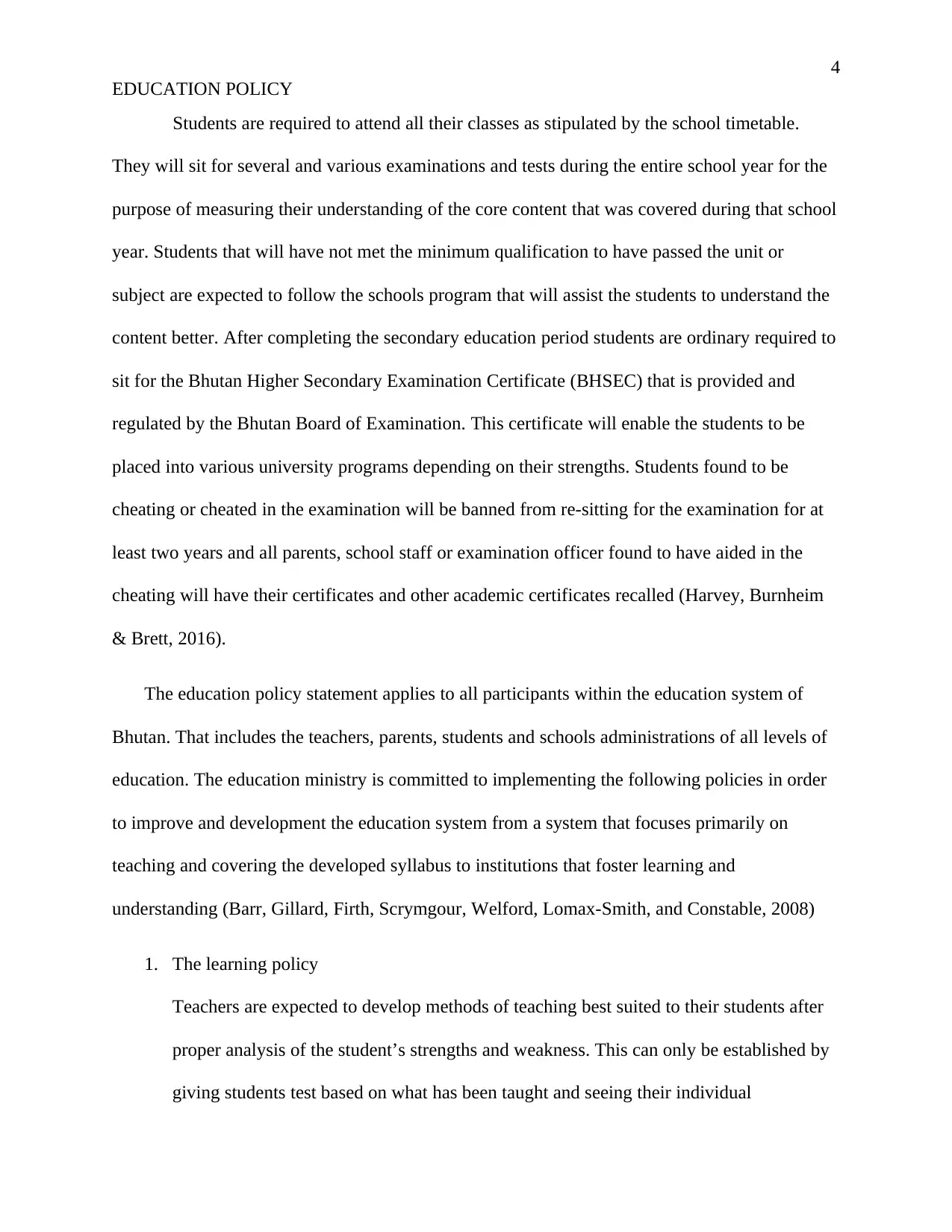
4
EDUCATION POLICY
Students are required to attend all their classes as stipulated by the school timetable.
They will sit for several and various examinations and tests during the entire school year for the
purpose of measuring their understanding of the core content that was covered during that school
year. Students that will have not met the minimum qualification to have passed the unit or
subject are expected to follow the schools program that will assist the students to understand the
content better. After completing the secondary education period students are ordinary required to
sit for the Bhutan Higher Secondary Examination Certificate (BHSEC) that is provided and
regulated by the Bhutan Board of Examination. This certificate will enable the students to be
placed into various university programs depending on their strengths. Students found to be
cheating or cheated in the examination will be banned from re-sitting for the examination for at
least two years and all parents, school staff or examination officer found to have aided in the
cheating will have their certificates and other academic certificates recalled (Harvey, Burnheim
& Brett, 2016).
The education policy statement applies to all participants within the education system of
Bhutan. That includes the teachers, parents, students and schools administrations of all levels of
education. The education ministry is committed to implementing the following policies in order
to improve and development the education system from a system that focuses primarily on
teaching and covering the developed syllabus to institutions that foster learning and
understanding (Barr, Gillard, Firth, Scrymgour, Welford, Lomax-Smith, and Constable, 2008)
1. The learning policy
Teachers are expected to develop methods of teaching best suited to their students after
proper analysis of the student’s strengths and weakness. This can only be established by
giving students test based on what has been taught and seeing their individual
EDUCATION POLICY
Students are required to attend all their classes as stipulated by the school timetable.
They will sit for several and various examinations and tests during the entire school year for the
purpose of measuring their understanding of the core content that was covered during that school
year. Students that will have not met the minimum qualification to have passed the unit or
subject are expected to follow the schools program that will assist the students to understand the
content better. After completing the secondary education period students are ordinary required to
sit for the Bhutan Higher Secondary Examination Certificate (BHSEC) that is provided and
regulated by the Bhutan Board of Examination. This certificate will enable the students to be
placed into various university programs depending on their strengths. Students found to be
cheating or cheated in the examination will be banned from re-sitting for the examination for at
least two years and all parents, school staff or examination officer found to have aided in the
cheating will have their certificates and other academic certificates recalled (Harvey, Burnheim
& Brett, 2016).
The education policy statement applies to all participants within the education system of
Bhutan. That includes the teachers, parents, students and schools administrations of all levels of
education. The education ministry is committed to implementing the following policies in order
to improve and development the education system from a system that focuses primarily on
teaching and covering the developed syllabus to institutions that foster learning and
understanding (Barr, Gillard, Firth, Scrymgour, Welford, Lomax-Smith, and Constable, 2008)
1. The learning policy
Teachers are expected to develop methods of teaching best suited to their students after
proper analysis of the student’s strengths and weakness. This can only be established by
giving students test based on what has been taught and seeing their individual
Paraphrase This Document
Need a fresh take? Get an instant paraphrase of this document with our AI Paraphraser
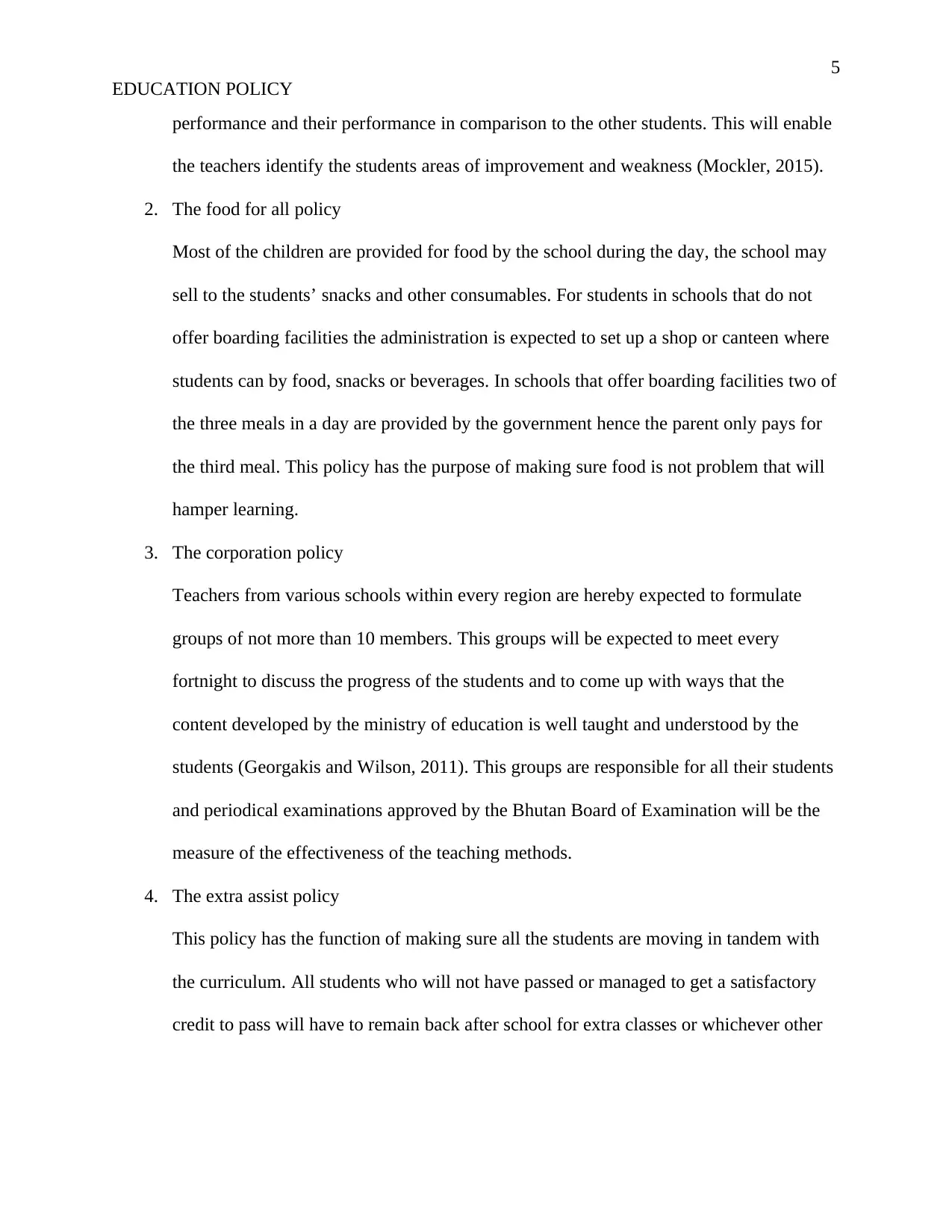
5
EDUCATION POLICY
performance and their performance in comparison to the other students. This will enable
the teachers identify the students areas of improvement and weakness (Mockler, 2015).
2. The food for all policy
Most of the children are provided for food by the school during the day, the school may
sell to the students’ snacks and other consumables. For students in schools that do not
offer boarding facilities the administration is expected to set up a shop or canteen where
students can by food, snacks or beverages. In schools that offer boarding facilities two of
the three meals in a day are provided by the government hence the parent only pays for
the third meal. This policy has the purpose of making sure food is not problem that will
hamper learning.
3. The corporation policy
Teachers from various schools within every region are hereby expected to formulate
groups of not more than 10 members. This groups will be expected to meet every
fortnight to discuss the progress of the students and to come up with ways that the
content developed by the ministry of education is well taught and understood by the
students (Georgakis and Wilson, 2011). This groups are responsible for all their students
and periodical examinations approved by the Bhutan Board of Examination will be the
measure of the effectiveness of the teaching methods.
4. The extra assist policy
This policy has the function of making sure all the students are moving in tandem with
the curriculum. All students who will not have passed or managed to get a satisfactory
credit to pass will have to remain back after school for extra classes or whichever other
EDUCATION POLICY
performance and their performance in comparison to the other students. This will enable
the teachers identify the students areas of improvement and weakness (Mockler, 2015).
2. The food for all policy
Most of the children are provided for food by the school during the day, the school may
sell to the students’ snacks and other consumables. For students in schools that do not
offer boarding facilities the administration is expected to set up a shop or canteen where
students can by food, snacks or beverages. In schools that offer boarding facilities two of
the three meals in a day are provided by the government hence the parent only pays for
the third meal. This policy has the purpose of making sure food is not problem that will
hamper learning.
3. The corporation policy
Teachers from various schools within every region are hereby expected to formulate
groups of not more than 10 members. This groups will be expected to meet every
fortnight to discuss the progress of the students and to come up with ways that the
content developed by the ministry of education is well taught and understood by the
students (Georgakis and Wilson, 2011). This groups are responsible for all their students
and periodical examinations approved by the Bhutan Board of Examination will be the
measure of the effectiveness of the teaching methods.
4. The extra assist policy
This policy has the function of making sure all the students are moving in tandem with
the curriculum. All students who will not have passed or managed to get a satisfactory
credit to pass will have to remain back after school for extra classes or whichever other
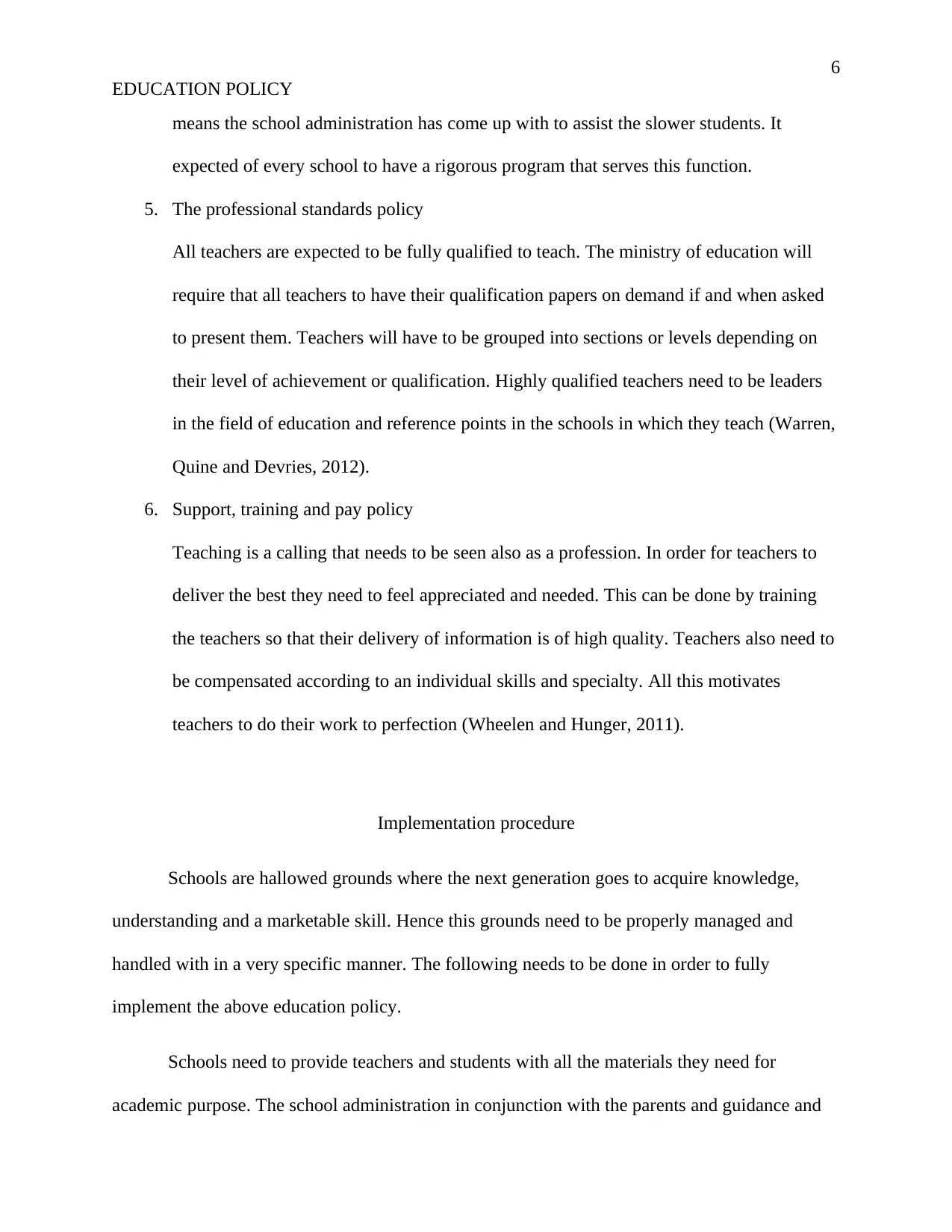
6
EDUCATION POLICY
means the school administration has come up with to assist the slower students. It
expected of every school to have a rigorous program that serves this function.
5. The professional standards policy
All teachers are expected to be fully qualified to teach. The ministry of education will
require that all teachers to have their qualification papers on demand if and when asked
to present them. Teachers will have to be grouped into sections or levels depending on
their level of achievement or qualification. Highly qualified teachers need to be leaders
in the field of education and reference points in the schools in which they teach (Warren,
Quine and Devries, 2012).
6. Support, training and pay policy
Teaching is a calling that needs to be seen also as a profession. In order for teachers to
deliver the best they need to feel appreciated and needed. This can be done by training
the teachers so that their delivery of information is of high quality. Teachers also need to
be compensated according to an individual skills and specialty. All this motivates
teachers to do their work to perfection (Wheelen and Hunger, 2011).
Implementation procedure
Schools are hallowed grounds where the next generation goes to acquire knowledge,
understanding and a marketable skill. Hence this grounds need to be properly managed and
handled with in a very specific manner. The following needs to be done in order to fully
implement the above education policy.
Schools need to provide teachers and students with all the materials they need for
academic purpose. The school administration in conjunction with the parents and guidance and
EDUCATION POLICY
means the school administration has come up with to assist the slower students. It
expected of every school to have a rigorous program that serves this function.
5. The professional standards policy
All teachers are expected to be fully qualified to teach. The ministry of education will
require that all teachers to have their qualification papers on demand if and when asked
to present them. Teachers will have to be grouped into sections or levels depending on
their level of achievement or qualification. Highly qualified teachers need to be leaders
in the field of education and reference points in the schools in which they teach (Warren,
Quine and Devries, 2012).
6. Support, training and pay policy
Teaching is a calling that needs to be seen also as a profession. In order for teachers to
deliver the best they need to feel appreciated and needed. This can be done by training
the teachers so that their delivery of information is of high quality. Teachers also need to
be compensated according to an individual skills and specialty. All this motivates
teachers to do their work to perfection (Wheelen and Hunger, 2011).
Implementation procedure
Schools are hallowed grounds where the next generation goes to acquire knowledge,
understanding and a marketable skill. Hence this grounds need to be properly managed and
handled with in a very specific manner. The following needs to be done in order to fully
implement the above education policy.
Schools need to provide teachers and students with all the materials they need for
academic purpose. The school administration in conjunction with the parents and guidance and
⊘ This is a preview!⊘
Do you want full access?
Subscribe today to unlock all pages.

Trusted by 1+ million students worldwide
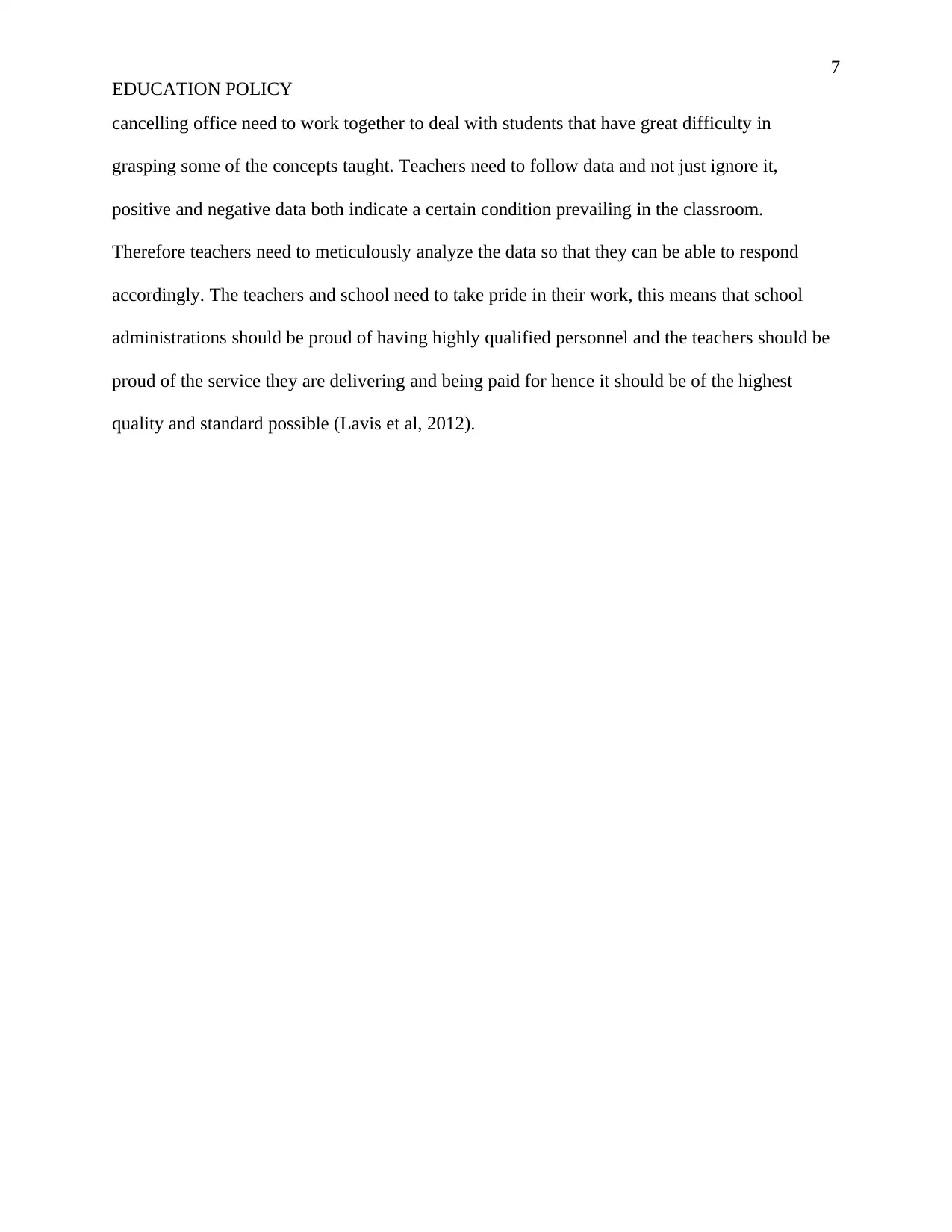
7
EDUCATION POLICY
cancelling office need to work together to deal with students that have great difficulty in
grasping some of the concepts taught. Teachers need to follow data and not just ignore it,
positive and negative data both indicate a certain condition prevailing in the classroom.
Therefore teachers need to meticulously analyze the data so that they can be able to respond
accordingly. The teachers and school need to take pride in their work, this means that school
administrations should be proud of having highly qualified personnel and the teachers should be
proud of the service they are delivering and being paid for hence it should be of the highest
quality and standard possible (Lavis et al, 2012).
EDUCATION POLICY
cancelling office need to work together to deal with students that have great difficulty in
grasping some of the concepts taught. Teachers need to follow data and not just ignore it,
positive and negative data both indicate a certain condition prevailing in the classroom.
Therefore teachers need to meticulously analyze the data so that they can be able to respond
accordingly. The teachers and school need to take pride in their work, this means that school
administrations should be proud of having highly qualified personnel and the teachers should be
proud of the service they are delivering and being paid for hence it should be of the highest
quality and standard possible (Lavis et al, 2012).
Paraphrase This Document
Need a fresh take? Get an instant paraphrase of this document with our AI Paraphraser
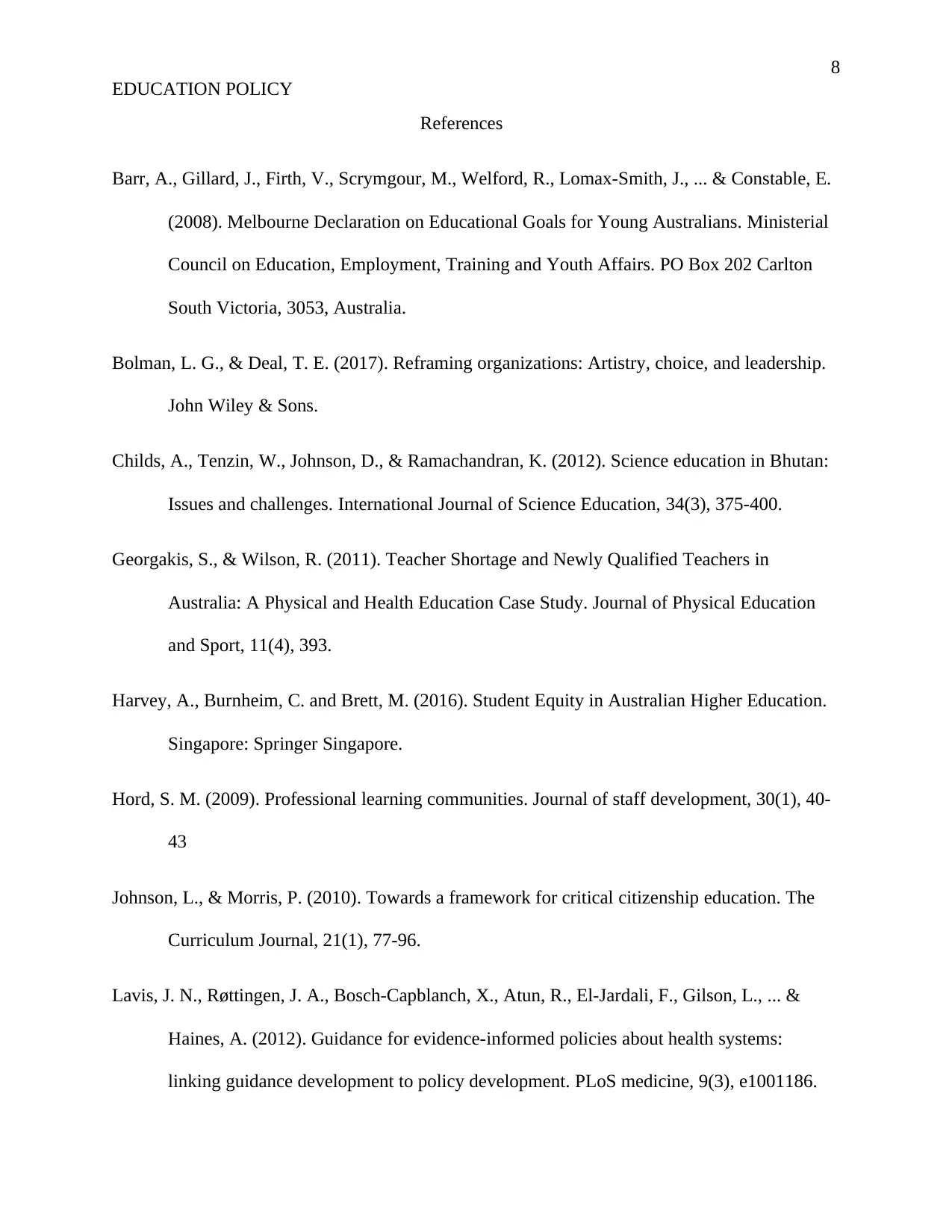
8
EDUCATION POLICY
References
Barr, A., Gillard, J., Firth, V., Scrymgour, M., Welford, R., Lomax-Smith, J., ... & Constable, E.
(2008). Melbourne Declaration on Educational Goals for Young Australians. Ministerial
Council on Education, Employment, Training and Youth Affairs. PO Box 202 Carlton
South Victoria, 3053, Australia.
Bolman, L. G., & Deal, T. E. (2017). Reframing organizations: Artistry, choice, and leadership.
John Wiley & Sons.
Childs, A., Tenzin, W., Johnson, D., & Ramachandran, K. (2012). Science education in Bhutan:
Issues and challenges. International Journal of Science Education, 34(3), 375-400.
Georgakis, S., & Wilson, R. (2011). Teacher Shortage and Newly Qualified Teachers in
Australia: A Physical and Health Education Case Study. Journal of Physical Education
and Sport, 11(4), 393.
Harvey, A., Burnheim, C. and Brett, M. (2016). Student Equity in Australian Higher Education.
Singapore: Springer Singapore.
Hord, S. M. (2009). Professional learning communities. Journal of staff development, 30(1), 40-
43
Johnson, L., & Morris, P. (2010). Towards a framework for critical citizenship education. The
Curriculum Journal, 21(1), 77-96.
Lavis, J. N., Røttingen, J. A., Bosch-Capblanch, X., Atun, R., El-Jardali, F., Gilson, L., ... &
Haines, A. (2012). Guidance for evidence-informed policies about health systems:
linking guidance development to policy development. PLoS medicine, 9(3), e1001186.
EDUCATION POLICY
References
Barr, A., Gillard, J., Firth, V., Scrymgour, M., Welford, R., Lomax-Smith, J., ... & Constable, E.
(2008). Melbourne Declaration on Educational Goals for Young Australians. Ministerial
Council on Education, Employment, Training and Youth Affairs. PO Box 202 Carlton
South Victoria, 3053, Australia.
Bolman, L. G., & Deal, T. E. (2017). Reframing organizations: Artistry, choice, and leadership.
John Wiley & Sons.
Childs, A., Tenzin, W., Johnson, D., & Ramachandran, K. (2012). Science education in Bhutan:
Issues and challenges. International Journal of Science Education, 34(3), 375-400.
Georgakis, S., & Wilson, R. (2011). Teacher Shortage and Newly Qualified Teachers in
Australia: A Physical and Health Education Case Study. Journal of Physical Education
and Sport, 11(4), 393.
Harvey, A., Burnheim, C. and Brett, M. (2016). Student Equity in Australian Higher Education.
Singapore: Springer Singapore.
Hord, S. M. (2009). Professional learning communities. Journal of staff development, 30(1), 40-
43
Johnson, L., & Morris, P. (2010). Towards a framework for critical citizenship education. The
Curriculum Journal, 21(1), 77-96.
Lavis, J. N., Røttingen, J. A., Bosch-Capblanch, X., Atun, R., El-Jardali, F., Gilson, L., ... &
Haines, A. (2012). Guidance for evidence-informed policies about health systems:
linking guidance development to policy development. PLoS medicine, 9(3), e1001186.
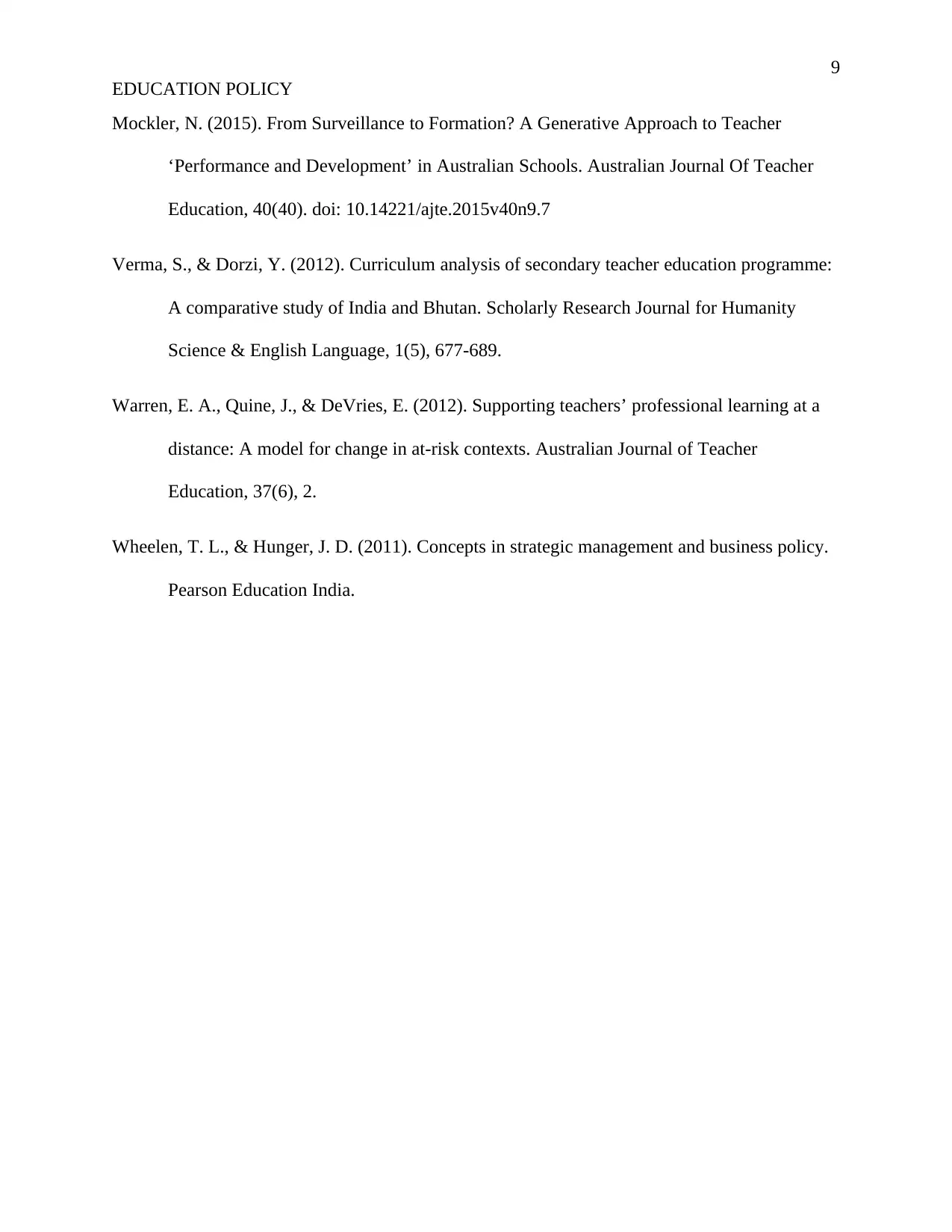
9
EDUCATION POLICY
Mockler, N. (2015). From Surveillance to Formation? A Generative Approach to Teacher
‘Performance and Development’ in Australian Schools. Australian Journal Of Teacher
Education, 40(40). doi: 10.14221/ajte.2015v40n9.7
Verma, S., & Dorzi, Y. (2012). Curriculum analysis of secondary teacher education programme:
A comparative study of India and Bhutan. Scholarly Research Journal for Humanity
Science & English Language, 1(5), 677-689.
Warren, E. A., Quine, J., & DeVries, E. (2012). Supporting teachers’ professional learning at a
distance: A model for change in at-risk contexts. Australian Journal of Teacher
Education, 37(6), 2.
Wheelen, T. L., & Hunger, J. D. (2011). Concepts in strategic management and business policy.
Pearson Education India.
EDUCATION POLICY
Mockler, N. (2015). From Surveillance to Formation? A Generative Approach to Teacher
‘Performance and Development’ in Australian Schools. Australian Journal Of Teacher
Education, 40(40). doi: 10.14221/ajte.2015v40n9.7
Verma, S., & Dorzi, Y. (2012). Curriculum analysis of secondary teacher education programme:
A comparative study of India and Bhutan. Scholarly Research Journal for Humanity
Science & English Language, 1(5), 677-689.
Warren, E. A., Quine, J., & DeVries, E. (2012). Supporting teachers’ professional learning at a
distance: A model for change in at-risk contexts. Australian Journal of Teacher
Education, 37(6), 2.
Wheelen, T. L., & Hunger, J. D. (2011). Concepts in strategic management and business policy.
Pearson Education India.
⊘ This is a preview!⊘
Do you want full access?
Subscribe today to unlock all pages.

Trusted by 1+ million students worldwide
1 out of 9
Related Documents
Your All-in-One AI-Powered Toolkit for Academic Success.
+13062052269
info@desklib.com
Available 24*7 on WhatsApp / Email
![[object Object]](/_next/static/media/star-bottom.7253800d.svg)
Unlock your academic potential
Copyright © 2020–2025 A2Z Services. All Rights Reserved. Developed and managed by ZUCOL.





